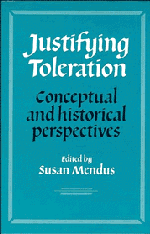Book contents
- Frontmatter
- Contents
- Preface
- Introduction
- 1 Scepticism and toleration in the seventeenth century
- 2 A more tolerant Hobbes?
- 3 Locke: toleration and the rationality of persecution
- 4 Toleration and Mill's liberty of thought and discussion
- 5 Rousseau and respect for others
- 6 The intolerable
- 7 Autonomy, toleration, and the harm principle
- 8 Friendship, truth, and politics: Hannah Arendt and toleration
- 9 Dissent, toleration, and civil rights in communism
- 10 Liberalism, marxism, and tolerance
- 11 Socialism and toleration
- Index
7 - Autonomy, toleration, and the harm principle
Published online by Cambridge University Press: 20 May 2010
- Frontmatter
- Contents
- Preface
- Introduction
- 1 Scepticism and toleration in the seventeenth century
- 2 A more tolerant Hobbes?
- 3 Locke: toleration and the rationality of persecution
- 4 Toleration and Mill's liberty of thought and discussion
- 5 Rousseau and respect for others
- 6 The intolerable
- 7 Autonomy, toleration, and the harm principle
- 8 Friendship, truth, and politics: Hannah Arendt and toleration
- 9 Dissent, toleration, and civil rights in communism
- 10 Liberalism, marxism, and tolerance
- 11 Socialism and toleration
- Index
Summary
This is a paper about the relation between two ideas, autonomy and toleration. Both are deeply rooted in liberal culture, and I shall rely on this fact. I shall say very little to explain the liberal concepts of personal autonomy and of toleration, just enough to make the points on which the argument of the paper depends. I shall say even less on the reasons for valuing personal autonomy. My purpose is to show that a powerful argument in favour of toleration is derivable from the value of personal autonomy. This is not a surprising conclusion. I hope some interest lies in the details of the argument; but the main interest is in what it does not establish, in the limits of the autonomy-based principle of toleration.
There are, of course, other powerful arguments for toleration. Their conclusions overlap those of the argument from autonomy, being narrower in some areas and wider in others. This is exactly what one would expect. It shows the strength of the commitment in our culture to toleration that it is supported by different arguments from different points of view. Nor need a single individual be too parsimonious in the arguments on which his faith in toleration rests. Many of them can be subsumed under one moral umbrella. There is, however, a special interest in closely examining the argument from autonomy. It is sometimes thought to be the specifically liberal argument for toleration: the one argument which is not shared by non-liberals, and which displays the spirit of the liberal approach to politics.
- Type
- Chapter
- Information
- Justifying TolerationConceptual and Historical Perspectives, pp. 155 - 176Publisher: Cambridge University PressPrint publication year: 1988
- 44
- Cited by



